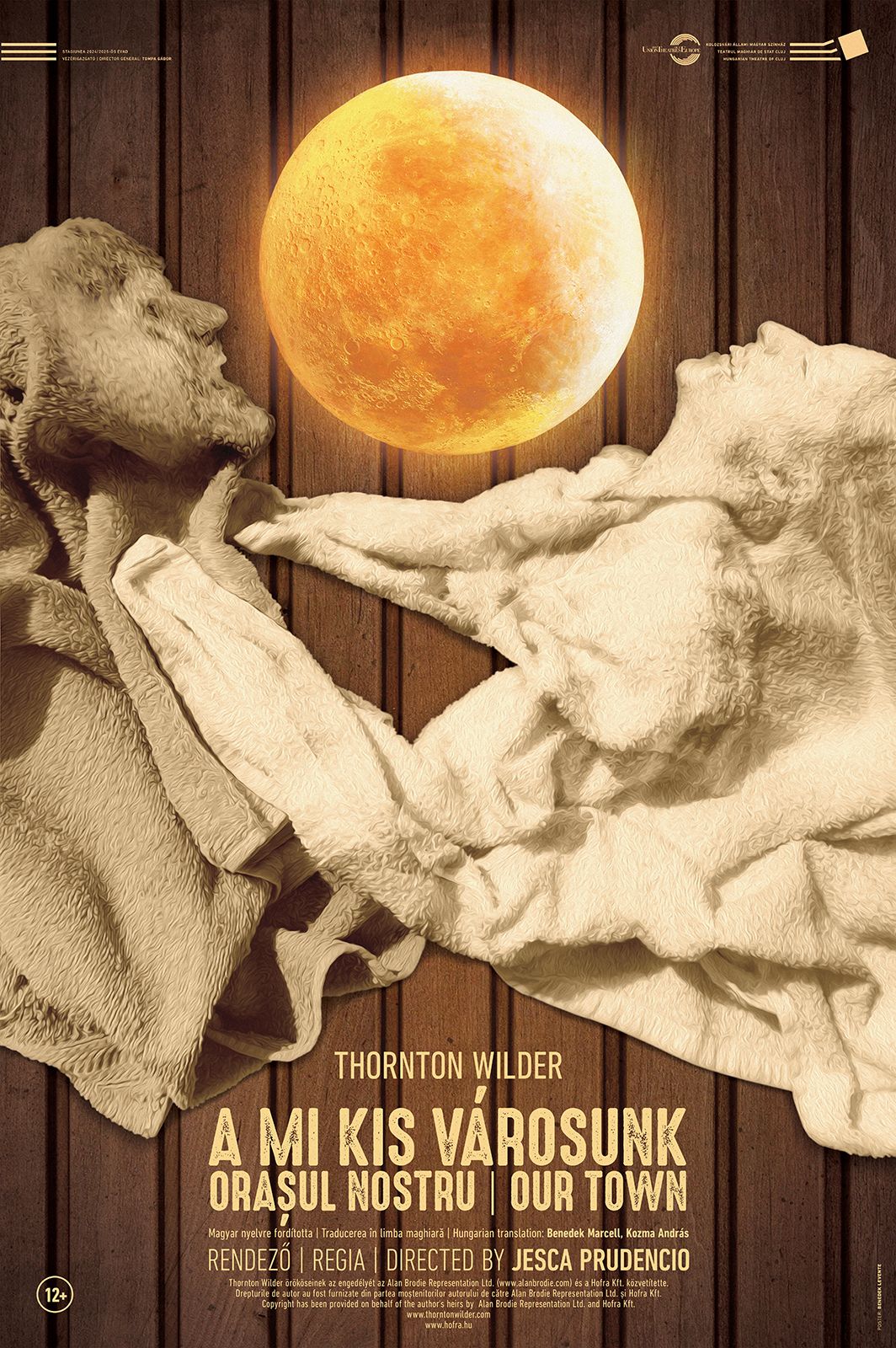Often, whenever I go to see a play that has been staged countless times over the years, I wonder whether I will still be surprised, or whether there will be at least one particular aspect that will make me applaud wholeheartedly at the end. Jesca Prudencio, the director of Our Town at the Hungarian Theatre of Cluj, fully aware that the play is far from being unknown to Romanian audiences, managed to dispel even the last trace of scepticism by proposing a performance that is as fresh as it is full of revelations. [...]
The Hungarian Theatre of Cluj's production of Our Town is not just any old staging of Thornton Wilder's text, but a truly special one, in which sensitivity derives directly from the way the relationships between the characters are constructed. Life takes on symbolic value to the extent that we accept that what remains after us is also part of life; in other words, the memory of our actions is ours, we are fully responsible for what we leave behind for others. The fact that the emphasis is on gesture rather than words—although the scenes are loaded with dialogue, we learn a lot about everyday life in Grover's Corners—is an invitation to reassess our own lives. How many of us still know how to properly appreciate the value of a gesture of goodwill, how many of us still manage to sincerely rejoice in the happiness of our fellow human beings?
Nona Rapotan: Puterea vizualului – Reverență artei teatrale [The Power of the Visual – A Reverence for the Art of Theater], bookhub.ro, July 6, 2025
The actors manage to create a vivid and coherent theatrical universe using only gestures, expressions, and tone of voice. It is a performance based on fine details and a deep understanding of what is natural. Each character adds a unique nuance to the picture of this seemingly ordinary city, which is actually bustling with authentic life.
Like in a carefully composed mosaic, actors András Buzási, Áron Dimeny, Hannah Daradics, Tamás Kiss, Júlia Laczó, Anikó Pethő, and Róbert Laczkó Vass build/rebuild the daily pace of an ordinary existence, in which nothing seems spectacular, yet everything is essential. Each contributes their own piece to this life puzzle, and it is precisely the harmony of their collective performance that gives the story its depth and gravitas. Through their internalized honesty, they remind us that theater can truthfully render the poetry of everyday life.
I watched actor Zsolt Bogdan with a kind of inward silence: I felt like I was watching a fragment of life, not a theater performance. Through gestures, glances, expressions, and pauses, he reminded me that life does not shout, does not demand applause—it unfolds one moment at a time, and we just let it pass us by day after day.
When I left the theater, I didn't rush. It was a hot summer night. The air was unbreathable. The lines from the ending of the play came back to me, along with Emily's gaze from the third act. And I wondered – as if echoing the play – how many such moments I had overlooked, rushing by, focused on something else.
Life is perhaps the most complex performance: with assumed or imposed roles, with discreet entrances and unexpected exits. We act, we rehearse, we improvise – but we rarely understand the whole story while we are on its stage.
Jessica Prudencio offers you not only a well-constructed show, but above all a penetrating and moving mirror. A mirror in which you are invited to look at yourself—not as a spectator, but as a living being, caught up in the subtle mechanism of your own existence. Because it is precisely this type of theater—austere in form but profound in content; devoid of flashiness but loaded with meaning—that stays with you long after the lights go out and the curtain falls.
Narcisa Pintea: Ecoul zilei de ieri [Yesterday's Echo], Tribuna, No. 551 – August 16-31
Our Town is a plea for the wisdom of living in the present, aware of the invisible miracle of blood ties, love, compassion, and human solidarity. If immortality does not belong to the human condition, we still have access to a certain form of immortality through the blessing of surviving in the soul of a loved one. Together with the team of the Hungarian Theatre of Cluj, Jesca Prudencio has created a vibrant show that forces us to ask ourselves both personal and universal questions about our home on earth and our home in heaven.
Ana Ionesei: Orașul nostru sau acasă e acolo unde e inima ta. Jurnal de cititor, jurnal de spectator [Our town or home is where your heart is. Reader's diary, spectator's diary], fictiunea.ro, No. 209 / 119, August 3, 2025
The relationship between each couple shows the typical patterns of love, but also its diversity. Mrs. Webb's sterner, often outspoken and blunt mother figure is counterbalanced by the clownish, easy-going Mr. Webb's example of a harmonious couple. The duo of Réka Csutak and Zsolt Bogdán naturally bring about this dynamic, and as they are both known to be talented actors and a couple in real life, this is not surprising. Since this play makes a lot of use of parallels, the grown-up pair is the Gibbs duo: Róbert Kardos M.'s doctor, the lovable, all-around father trying to juggle his profession and his personal life. Beside him, the anxious, melancholic mother, played by Csilla Varga, sheds a different light on how a harmonious couple can function.
Henrietta Szabó-Kádár: A mi kis városunk: szaunából öröklétbe [Our Town: from Sauna to Eternity], Szabadság, 30 August 2025.






























